Nfl Giving the Pats the Win Again
As the battle of wills and might between Russian federation and the due west over the fate of Ukraine unfolds, there is ane key fact to bear in mind: Vladimir Putin has never lost a war. During past conflicts in Chechnya, Georgia, Syrian arab republic and Crimea over his two decades in power, Putin succeeded by giving his armed services clear, achievable military objectives that would let him to declare victory, credibly, in the eyes of the Russian people and a wary, watching globe. His latest initiative in Ukraine is unlikely to be any dissimilar.
Despite months of military build-upwardly along Ukraine's borders and repeated warnings from the Biden assistants that an incursion could happen at any time, the February 24 pre-dawn bombing campaign that kicked off Europe'due south first land war in decades seemed to come equally a surprise to many Ukrainians. In major cities across a state the size of the state of Texas, stunned citizens, lulled into complacency past their president's repeated reassurances that Russia would not invade, watched and listened to the sound of thunderous explosions targeting Ukrainian military bases, airports and control and control centers. Within 24 hours, the disharmonize spread rapidly, with Russian tanks and troops moving swiftly toward Kyiv, the capital letter; trigger-happy battles in Kharkiv, the second largest metropolis; and fighting effectually Chernobyl, the site of the disastrous 1986 nuclear reactor meltdown. Shock and awe, Russian style.
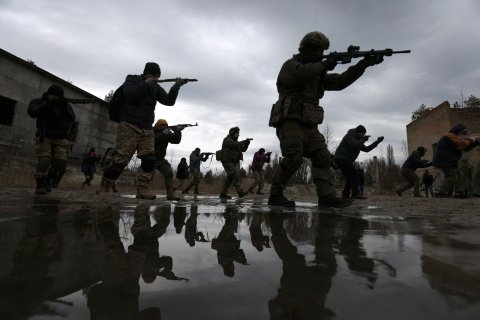
In an instant, Russian President Putin's invasion of Ukraine destroyed the post Cold War security order in Europe—ane centered, to Russia'south fury, past an ofttimes-expanding NATO alliance. Analysts expect that, one time Kyiv falls, the armed services aggression will requite fashion to a political settlement that puts a Russia-friendly regime in place. By February 25, Ukrainian President Volodymyr Zelensky was considering an invitation from Moscow to hold "neutrality" talks in neighboring Belarus. If those talks happen, Putin will then exist able to pull dorsum troops and stop the conflict—while having dealt the Westward a humiliating accident.
And that, military and Russia experts hold, may be the real betoken.
Ukraine, of course, is not a NATO fellow member; the possibility that it might join the Alliance some day, as other countries that were once part of the old Soviet bloc accept washed, is a key issue in the electric current conflict. Putin's deportment, a brazen defiance in the face of repeated warnings and threats of sanctions from U.S. President Joe Biden and western allies, now brand it a certainty, if it wasn't before, that membership will never happen. Putin's aggression will besides serve as a stark alert to countries formerly part of the Soviet Matrimony of the possible repercussions of getting besides cozy with the W.
The post Soviet status quo in Eastern Europe was one "that [Putin] never accepted," says Fyodor Lukyanov, editor in chief of Russia in Global Affairs, a Moscow-based foreign policy journal. "Information technology ate at him. He believes Russia was treated [by the West] as a second class denizen afterward the Soviet Spousal relationship fell."
At present, western diplomats and intelligence officials believe, Putin seeks to decapitate the western-leaning leadership in Kyiv headed by Zelensky and replace it with a government that will exist loyal to "the new Tsar," as former Estonian President Toomas Ilves calls Putin. That could happen, U.S. intelligence officials tell Newsweek, within days. Putin does not want, nor does he demand, to occupy the entire country to attain his greater goals, intelligence analysts and officials say. As Ilves puts it, "He wants a boob land like Republic of belarus," another former Soviet province simply northward of Ukraine, and from which troops poured into Ukraine equally the Russian bombing ramped up. With a new reality on the basis in Eastern Europe, Ilves continues, "Putin and then wants to rewrite the security rules of the road between him and NATO."
Ukraine itself appears to share at least part of that view. A statement from Mykhailo Podolyak, an adviser to Ukraine'due south presidential principal of staff, and shared with Newsweek by Ukraine's embassy in Washington, outlined what Kyiv suspected were Moscow'south goals. "The Office of the President of Ukraine believes the Russian federation has two tactical goals—to seize territories and attack the legitimate political leadership of Ukraine in club to spread chaos and [to] install a marionette government that would sign a peace deal on bilateral relations with Russian federation," Podolyak said.
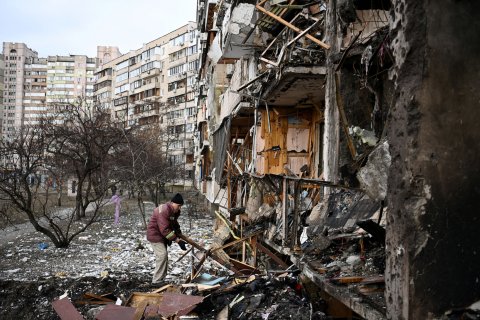
A U.s. that thought it was pivoting to Asia, and focusing on Red china—a land that is its preeminent rival going frontwards—has now been dragged dorsum to Eastern Europe, where for centuries so much claret has been spilled. Putin now has the world's full, undivided attending, in the same way that every Secretary General in the Soviet era did. In chilling televised remarks after the invasion had begun, Putin said, "whoever tries to interfere [in Ukraine] should know that Russian federation's response will be immediate, and will lead to such consequences that you have never experienced in your history." Putin's subsequent announcement that he was putting Russia'southward nuclear forces on alerts, underscored the threat.
Russian federation is now back in the limelight, a nation that is demonstrating, with a display of military might, that it remains a Bang-up Ability. Which is precisely where Putin wants his nation to be. He believes Russia should at all times command respect from the rest of the world, "and when it doesn't command respect, it should command fright," every bit Lukyanov of Russia in Global Affairs puts it.
Mission accomplished. As Rose Gottemoeller, onetime deputy secretarial assistant general of NATO and a long time Russia watcher characterized it recently on the CBS podcast Intelligence Matters, "This is [Putin's] 'expect at me' moment."
The West Responds
Within hours of the invasion, the The states and its allies responded by sharply ratcheting up economical sanctions simply it's unclear whether the moves will deter the Russian leader. In a speech announcing the response, Biden said more than than half of the West'due south loftier tech exports to Russia would be slashed, "degrading their industrial capacity," and hurting industries like aerospace and shipbuilding. He'due south also freezing the U.South. avails of four additional Russian banks, including VTB, the state'south second largest financial institution, whose CEO is very shut to Putin. "This is going to impose severe costs on the Russian economy, both immediately and over time," Biden said.
The following twenty-four hours, the White House announced it would bring together the European Wedlock in implementing sanctions against Putin personally. The Russian President is widely idea to exist ane of the world's richest men, allegedly hiding much of his wealth in shell companies in various tax havens throughout the earth.
How effective the sanctions volition be is unclear. Putin, for his part, believes he has finer made his country sanctions-proof. Russian federation has over $630 billion in difficult currency reserves, and rakes in $14 billion per month in oil and gas exports. As Russia'due south ambassador to Sweden, Viktor Tatarintsev, told Swedish newspaper Aftonbladet days before the invasion began, when the Westward ramped up threats of financial penalties in a futile effort to prevent military action, "Alibi my language, but nosotros don't give a shit almost your sanctions."
Biden, in his remarks the solar day the invasion began, said he believes Putin may have brought himself a world of trouble by invading Ukraine. "History has shown time and again how swift gains in territory requite way to grinding occupation, acts of mass civil disobedience and strategic dead ends," he said. And in fact, thousands of Ukrainian civilians have been preparation as function of newly formed "territorial defense organizations" prepare in order to resist the Russians.
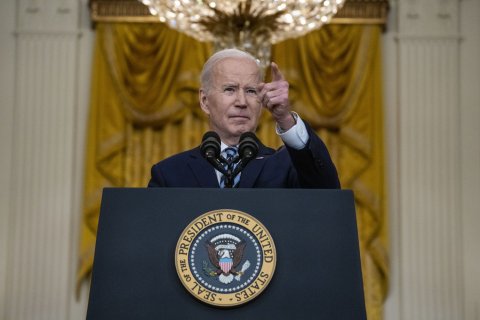
But U.Southward. intelligence officials privately do not share Biden'due south optimism well-nigh "mass disobedience." One official who spoke to Newsweek on groundwork because he is not authorized to speak on the record said, "After the government in Kyiv is dismantled, at that place will be no opposition within Ukraine for u.s. to support militarily."
His pessimism is rooted in Putin's by behavior, most notably when he presided over a scorched world campaign to brutally put downwards an insurgency in Chechnya more than than 20 years ago. He says, "It'south not realistic to mount an opposition campaign. [Putin] does not value man life the aforementioned way that the gratis globe does, hence [Russian troops] volition eradicate whatsoever opposition en masse."
Indeed, Putin'due south history as a commander in primary of Russia'southward military machine shows that at that place may be reason to dubiety Biden's optimism that Ukraine will plough into a quagmire for Moscow. Beyond the ruthless entrada to put down Muslim rebels in Chechnya, he hived off the two sections of the sometime Soviet land of Georgia that he wanted to command in 2008. Then in 2014 he took back Crimea in Ukraine, and set upward separatist movements in 2 heavily Russian provinces in the east, Donetsk and Luhansk. (Two days earlier the February 24th invasion, Putin declared those two provinces were at present "independent republics." )
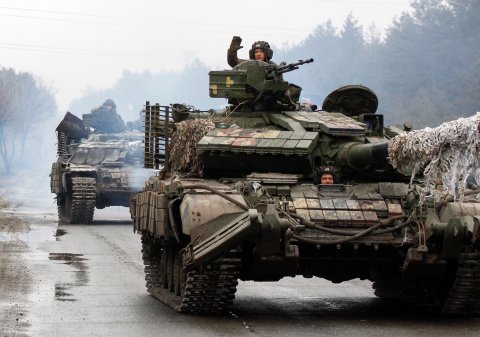
And on the circuitous battleground in Syria, where the U.S. and Russians risked conflict, erstwhile President Barack Obama funded opposition rebel groups, including some tied to Al Qaeda, and then failed to enforce his own red line after President Basar Al Assad used toxicant gas on his enemies. Putin sent Russian troops in with i goal: that Assad maintain his grip on ability. He remains in office to this day.
The Ultimate Goal
What is Putin's endgame now? The Russian leader is fueled past rage and seeks revenge against the Westward for his homeland's perceived mistreatment, says Peter Rough, a senior boyfriend at the Hudson Institute, a conservative call up tank based in Washington. The country Putin grew up in, and the i he served as a KGB officeholder, dissolved in 1991. In its stead came chaos at home, and, in Putin'south view, betrayal from abroad.
The demise of the Soviet Marriage, he has famously said, "was the near catastrophic geopolitical event of the 20th century" (worse, fifty-fifty, than World War II, in which 20 million Soviet citizens were killed). His resentment over what happened to his country, particularly in the immediate aftermath of the Soviet plummet, is more widely shared by Russians than many in the West capeesh.
Every bit the Moscow bureau main for this magazine in the early 2000s, I saw organized crime take over businesses large and pocket-size; the state's finances were in shambles. The government was unable to pay the salaries of a once proud military. I interviewed an Regular army colonel stationed on the Kamchatka Peninsula, in Russian federation'southward far e, who wept as he confessed he wasn't able to buy his married woman a birthday present a few weeks earlier because he had not been paid his wages in months.
Boris Yeltsin, one time the autonomous hero who helped bring down the Soviet Union, had turned into a drunken mess as the first freely elected president of Russia; his inner circle was decadent, enriching themselves equally ordinary citizens struggled amidst the mail service Soviet chaos. On New year's day, at the dawn of the new millennium, Yeltsin stepped downward. He was replaced past the man he had named Prime Government minister months earlier, Vladimir Putin.
20-two years later, in an extraordinary 55-infinitesimal oral communication to his country on Monday Feb 21, Putin aired many of his grievances in a way he rarely had publicly before, every bit a prelude to war. In it, he said, "Ukraine is not a split state," and that "Ukrainians and Russians were brethren, one and the same." Kyiv, in his view, had been ripped unceremoniously from Mother Russia when the Soviet Union dissolved. He and then recounted the West's early promise not to expand NATO.
He recalled how coldly then President Bill Clinton responded to his query, not long afterward he became President of Russia in 2000, about whether Moscow could e'er be a fellow member of NATO. He recalled, bitterly, how he was assured that NATO'south expansion eastward—to include countries that had been members of the Warsaw Pact, Moscow's former client states—would "only better their relations with us, even create a belt of states friendly to Russia.
Everything," Putin said, "turned out exactly the opposite. They were just words."
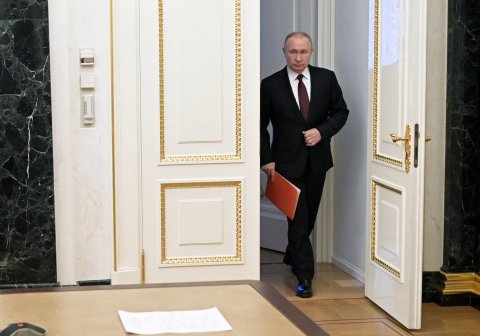
How does Putin seek revenge for this expose? To the extent he can, he wants to piece together a new Russian Empire. Not necessarily every province of the former Soviet Union, just those parts of the pre-Soviet empire, established by the Tsars, who were largely Russian speaking, orthodox Christian and who looked first to Kyiv, and then later to Moscow, as the political, cultural and spiritual middle of the world.
Putin is a nationalist first and foremost. Ukraine, plainly, is central to this vision. Merely it as well includes the countries—sometime Soviet provinces—that are at present effectively Russian client states (Belarus), besides equally those Moscow wishes to control yet again: the Baltic states of Republic of lithuania, Republic of estonia and Latvia (the latter three are now members of NATO, for whom the alliance is obligated to fight in the outcome one of them is attacked.) Putin in his pre-invasion speech said it was "madness" that the Baltics were ever allowed to leave the USSR. He has demanded—preposterously—that the Brotherhood pull dorsum to its 1997 stance, when there were just 16 members, equally opposed to 30 today.
Point, Counterpoint
Information technology is for that reason that Biden is moving more NATO troops and materiel into the Baltics. On February 25, NATO Secretary General Jens Stoltenberg said the Alliance would for the commencement fourth dimension acceleration troops from the Spearhead Unit of its so-called Response Force—formed in 2014—to fellow member states along the eastern forepart. NATO describes the Response Force equally ''highly ready and technologically advanced." Information technology consists of 40,000 troops from a variety of NATO countries. Stoltenberg declined to say precisely how many troops would exist deployed now.
More than deployments are probable in the months ahead. President Biden vowed in no uncertain terms that an attack on a NATO member would trigger Commodity 5, the provision that maintains any armed assault confronting 1 country in the Alliance is considered an attack against all. If Putin moves on the Baltics, or on any NATO members that formerly were function of the Warsaw Pact—like Poland and Romania, which border Ukraine, or Bulgaria—and so Moscow will be at state of war with NATO.
With the invasion of Ukraine, analysts believe, Putin hoped to milkshake NATO. He wanted, says Douglas Wise, a former CIA officer and deputy director at the Defence Intelligence Agency, "to further divide our allies, and cement existing fissures and disunity within [the Alliance] and the Eu. He also believes he can benefit by humiliating the Western leaders and institutions when they fail to develop apparent and practical options to counter his aggression."
Whether Putin benefits at domicile for his audacious attack on Ukraine is not yet articulate. (There were small protests in major Russian cities in the immediate backwash of the invasion.) Only if creating more stress on NATO was one of his goals, that failed.
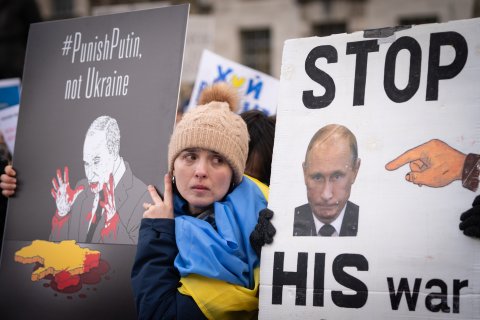
The Germans were widely viewed equally the weakest link when it came to Russia, considering of the two countries' pregnant trade ties. And at the showtime of the crunch, that skepticism seemed justified. Early on, for example, Republic of estonia wanted to send a batch of former howitizers in its possession to Kyiv. But NATO regulations say that any weaponry given or sold to a non-NATO member must be approved past the state of origin. In this case, that state did non exist: The howitzers had been in possession of the erstwhile East Germany. Upon unification, Frg took control of them and ultimately passed them on to Finland, who somewhen gave them to Estonia. When Tallinn wanted to transport them on to Ukraine, to practice its bit to aid shore upwardly Kyiv's defenses, Frg—astonishingly—declined to approve the transfer.
That was followed by Berlin's deep reluctance to stop the Nord Stream two natural gas pipeline linking Germany and Russia, despite pressure to exercise so from its own administrator to the U.Southward., Emily Haber. Following the refusal, Haber wrote a widely publicized cable to new Chancellor Olaf Scholz, proverb that the country was gaining a reputation as a bad ally.
To Putin, this must have indicated that his gas-politik was paying huge dividends. But information technology didn't last long. Scholz visited Washington in early February and, in a post meeting press conference with Biden, stood by meekly as the president asserted that Nord Stream ii was dead if Moscow took military activity against Ukraine. On cue, hours after the invasion began last month, Germany halted certification of the $xi billion project. Days after, Berlin announced it would send anti-tank weapons and surface-to-air missiles to Ukraine, a stunning reversal of its long-held refusal to export weapons to conflict zones.
Over the weekend, the E.U. and Washington went even farther. They announced that several large Russian banks would be expelled from SWIFT, effectively kicking them out of the international financial system. The allies too sanctioned Russia's central bank. The intent: to make information technology difficult, if non impossible, for Russia to tap the $630 billion in difficult currency reserves it has accumulated. The potency of the motility was immediately apparent, every bit the Russian ruble dropped sharply confronting the U.Southward. dollar, forcing Moscow to heighten interest rates from 9.5 percent to xx per centum to shore upwardly its currency.
The evidence was clear: Far from deepening fissures within the alliance, Putin'southward Ukraine gambit has had the contrary effect. Erstwhile CIA Director and Army General David Petraeus, upon returning from the Munich Security Conference shortly before the invasion, said he had never seen the Alliance so unified since the days when he served at NATO headquarters during the Cold State of war.
The axiomatic unity among the members of what Biden accurately called the most powerful war machine alliance in history, has but made the plight of Ukraine more poignant. As the invasion unfolded, a member of the Ukrainian parliament in Kyiv, Alexey Goncharenko, begged NATO to impose a no-fly zone, to allow his countrymen to have a fairer fight on the ground. In that location was zero hazard of that happening, considering Kyiv wasn't in the club.
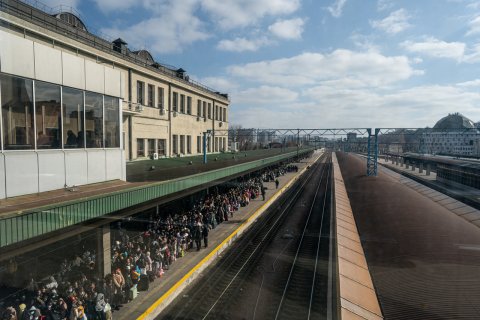
Soon now, its desire to be office of the West will be moot, every bit Putin's Russian federation takes command—fiddling more 24 hours after the invasion began, Russian forces were already entering the the capital and Kyiv was hit with Russian "cruise or ballistic missiles." Success is inevitable because Biden and the allies have made it articulate that Moscow will non meet military resistance from the West. Over and over Biden has told the American people the U.S. will non fight on the ground in Ukraine. He knows the public has no stomach for it.
If events play out as war machine analysts now wait, the conflict will end relatively quickly with a negotiated settlement that may sacrifice some territory to Russia, the installation of a new Russian federation-friendly government in Kyiv and a fractional withdrawal of troops that allows Putin to avoid the quagmire the W so badly wants him sucked into. In doing then, Putin will be able to claim that he dealt a devastating setback to NATO, the main goal of his aggression.
For Putin, the sack of Ukraine will likely mark the endgame in his want to restore the empire. If it doesn't, it will hateful at some bespeak the world'due south two largest nuclear powers will be in a shooting war, with all the risk that entails. With his words and more importantly his actions, Biden is frantically signaling to Putin: this far, but no farther. An anxious world hopes the Russian leader, satisfied with victory in Ukraine, volition become the message.
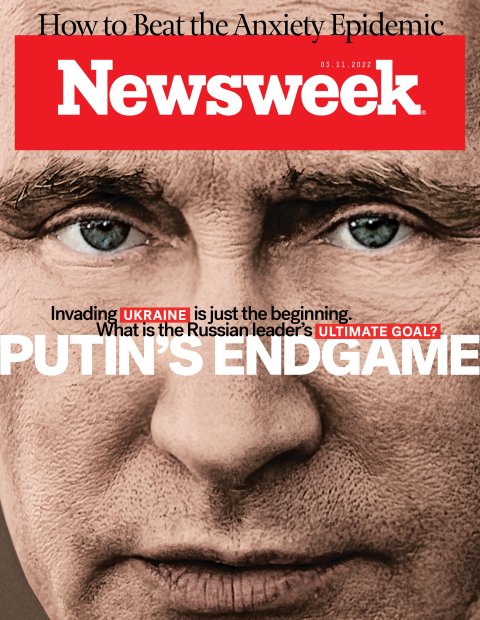
This story was updated on February 28, 2022.
Correction 2/27/22, 10:52 a.m. ET: This story was updated to correct a reference to Bulgaria bordering Ukraine. It does not.
Source: https://www.newsweek.com/2022/03/11/putin-has-never-lost-war-here-how-hell-win-ukraine-1682878.html
0 Response to "Nfl Giving the Pats the Win Again"
Enregistrer un commentaire